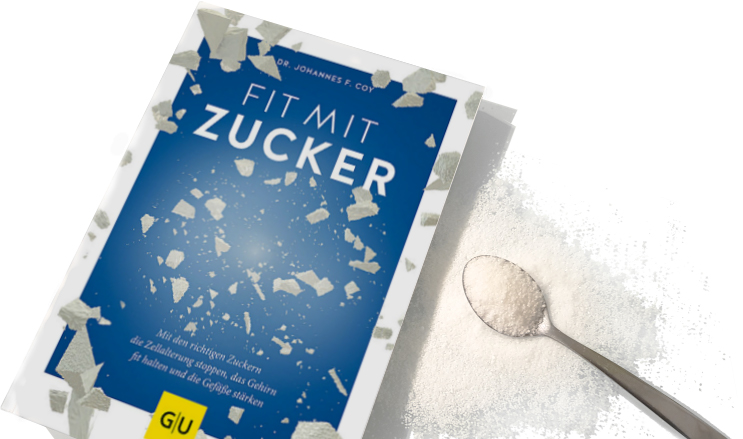Learn more about Dr. Coy and the creation of his sugar solutions.
Dr Johannes Coy is a world-renowned scientist whose research focuses on the health benefits of sugar awareness. Dr Coy has made a number of important genetic discoveries which change our understanding of cancer and nutrition and make him the leading expert on sugars.

Book: Fit with Sugar, by Dr Johannes Coy
Dr Coy has written several books about cancer nutrition. His latest book, Fit with Sugar, is now available. In this book, you’ll discover the evolutionary role of sugar in the human body. Consuming too much conventional sugar isn’t good for our health, but with the right sugars, we can stop cell ageing, keep the brain fit, protect against diseases and switch on fat burning. Find out how you can maintain physical and mental performance using natural low- glycaemic sugars and sugar substitutes. The book includes many delicious recipes for cakes, snacks and desserts, so you can implement a sugar-conscious diet easily and intelligently, without giving up sweet treats.
Buy the book: Cancer-Fighting Diet: Diet and Nutrition Strategies to Help Weaken Cancer Cells and Improve Treatment, by Dr Johannes Coy.
Research & Resources
Diabetics with COVID-19
High Sugar Levels and COVID-19
Research from Wuhan, China reveals that elevated blood sugar levels in COVID-19 patients without a previous diabetes diagnosis are associated with a more than twofold increase in the risk of death and higher chances of severe complications. The study, published in the journal Diabetologia, examined the relationship between fasting blood glucose levels upon admission and the 28-day mortality of COVID-19 patients without prior diabetes. The results showed that patients with higher blood glucose levels had a significantly higher mortality risk. Men and those with higher pneumonia severity scores also faced a greater risk of death. Additionally, patients with elevated blood glucose levels had a higher likelihood of experiencing complications. The study suggests that acute hyperglycemia may impact the prognosis of hospitalized COVID-19 patients, potentially through changes in coagulation, endothelial function, and the release of inflammatory cytokines. The authors emphasize the importance of blood sugar testing and control for all COVID-19 patients, even if they do not have a pre-existing diabetes diagnosis, to improve treatment outcomes during the pandemic.
A Machine-Generated View of the Role of Blood Glucose Levels in the Severity of COVID-19
SARS-CoV-2, the virus that caused COVID-19, spread rapidly worldwide. Researchers analyzed 240,000 scientific articles and found that elevated blood glucose levels played a significant role in the severity of the disease. The virus exploited high glucose levels to weaken the immune system, enter cells, replicate, and trigger inflammation and damage. Manual review and computational modeling supported this hypothesis. Elevated glucose levels could explain the varying severity of COVID-19 and had implications for diagnostics, treatments, and critical care.
Elevated Glucose Levels Favor SARS-CoV-2 Infection and Monocyte Response through a HIF-1α/Glycolysis-Dependent Axis
It remains unclear why individuals with uncontrolled glucose levels and diabetes are more susceptible to developing the severe form of COVID-19. However, studies have shown that monocytes and macrophages, the most enriched immune cell types in the lungs of COVID-19 patients, undergo metabolic changes that facilitate SARS-CoV-2 replication. These changes involve increased glycolysis mediated by hypoxia-inducible factor-1α (HIF-1α), which inhibits T cell response and reduces epithelial cell survival. Targeting HIF-1α could hold therapeutic potential for the development of novel drugs to treat severe COVID-19.
Tolerance of Human Fibroblasts to Benfo-Oxythiamine In Vitro
This study aimed to investigate the potential application of B-OT in the aspiration tract. An in vitro model was developed to assess the tolerance of primary human gingival fibroblasts to B-OT during mouth-washing simulation. The results showed no adverse effects on the cells even at high concentrations of B-OT (up to 1000 µM). Further testing with continuous exposure to B-OT in medium also demonstrated good tolerance, with minimal effects observed at 10 µM and a slight reduction at 100 µM. These findings support the potential use of B-OT as a mouth-washing solution and nasal spray, highlighting its favorable tolerance by oral cells.
Get in touch with Intelligent Sugar
Got a question about Dr Coy’s sugars? Contact info@intelligentsugar.info
If you have a question about a specific health condition, please speak to your doctor.

